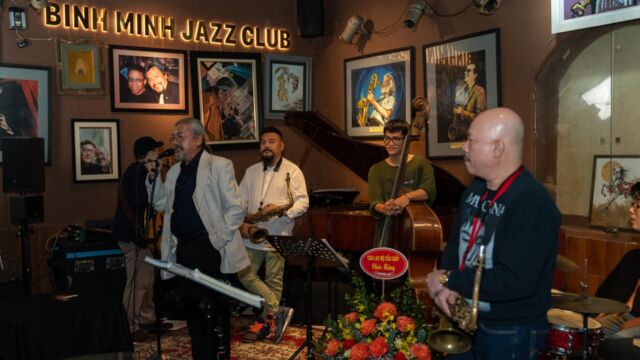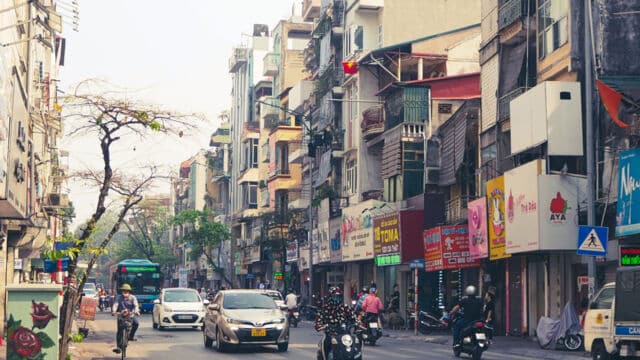Tiến Bộ Tavern | 2,500 words
Translated from Vietnamese by Sydney Van To
It was like the chime clock’s bell had fallen straight down. This tavern possessed an atmosphere as intimate as a family’s living room—as if from somewhere in this alley, in this garden, under the rooftops of this city, through spirals of smoke emerging from rows of roasting duck, and burning the eyes of generations of vendors, time was being made to pass serenely, gracefully and deliberately, step by step. Time did not rush here. Time had some of itself to spare for me.
It was four in the afternoon. I seemed to have been lifted out of the headaches of my unfinished work. If a day were a human lifespan, then “youth” is not actually in the morning, but at four p.m. Dusk and the late night were still ahead of us. At this moment, I felt so free, even happy, that when the owner’s child came back from school and bowed to greet me, I responded with a nod—something I do not usually do.
Some surprising news: Hanoi no longer has a real tavern, that is, not those restaurants serving food and draft beer, or the Westernized bars only suited to foreigners. There had once been four taverns, jokingly referred to as the Four Towns of Hanoi: one at 27 Tạm Thương, one at 8 Thợ Nhuộm, one at 123 Nguyễn Khuyến, and the last, according to some, was at 13 Lê Duẩn, although others were convinced that it was the café Cuối Ngõ in the Cầu Giấy district. They had been broadly alike: small and somewhat shabby places, in 1970s-style tenements, shared toilets at the back, the owners old folks, with their regulars pulled from their own circle of acquaintances, all too often inebriated. Now, they only have one thing in common: they have all closed down because they can’t compete against other places that sell the toxic and cheap drink known as rượu ta, our “native liquor.” If there is still a tavern left, it is a place once regarded as only B-rated, but now a towering tree casting its shade over the rest, called Tiến Bộ, which translates as “Progress”.
If coffee shops pulsate with the presence of young people, then traditional taverns had been where middle-aged people lived out their nostalgia. Perhaps coming to hide from the world, perhaps coming to find the world. I rank among the few young people who, aspiring to become an artist, seeks to float away in the yeast of alcohol. And I have come looking for the world: if you are willing to bathe yourself in the stinging fumes of Tiến Bộ, a host of characters fit for literature can be found. For those our age, to be a writer means being like Haruki Murakami, that is, living in a bar and perceiving each person according to their unique individual identity, and not according to how their daily lives are organized.
In a dead-end alley called Lý Văn Phức, just a few steps away from the Hàng Đẫy Stadium, this tavern is nestled amidst the smoke of a street known for its Chinese barbeque. It’s named after Tiến Bộ printing factory, one of those traditional Hanoi printing factories which thrived after the reunification of Vietnam. But beforehand, the tavern had a longer and more avant-garde name. It was called “Where is the Future of Our Homeland’s Art and Culture Going?”
For an entire year, this ironic question made it impossible for customers to remember the tavern’s name, while also annoying local government officials. So the tavern shortened its name to “Future” before changing it again to just “Progress” (Tiến Bộ). With its positive connotation of looking ahead and meeting certain milestones along the path to a bright future, the word “progress” was a popular word during Vietnam’s Subsidy Period from the mid-1970s to the mid-1980s. But after “Progress” came into existence, this adjective quickly transformed into a verb as well. Don’t be alarmed if your friend curtly texts you, “How’s Progress?”—he is not trying to motivate you. It only means he wants to have a drinking challenge with you at Tiến Bộ.
But “progress” is not the only thing which has been brought from the past. The whole menu calls us back to the Subsidy years: unpeeled potatoes, prawn crackers with some pâté, pickles with bits of dried pork belly…
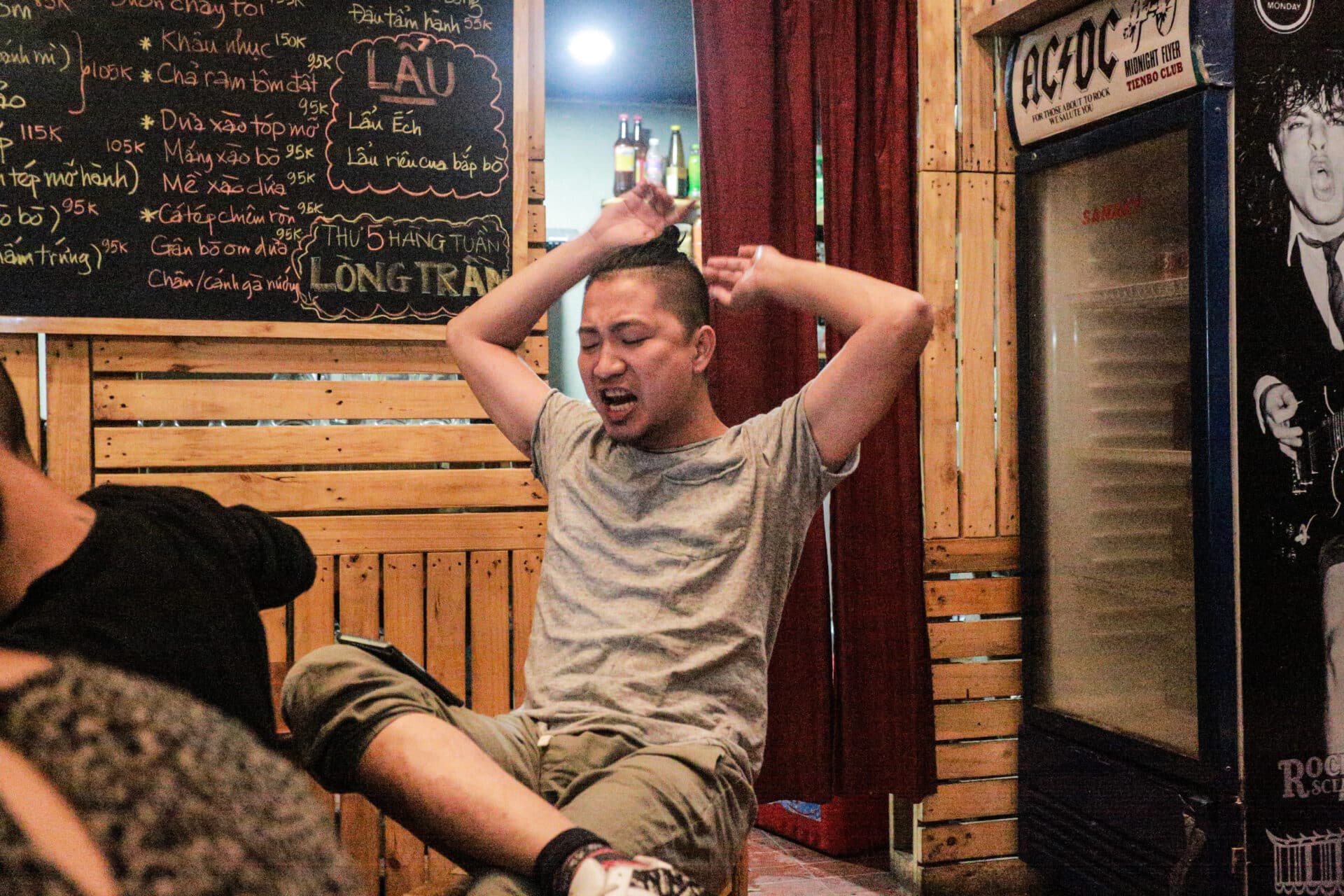
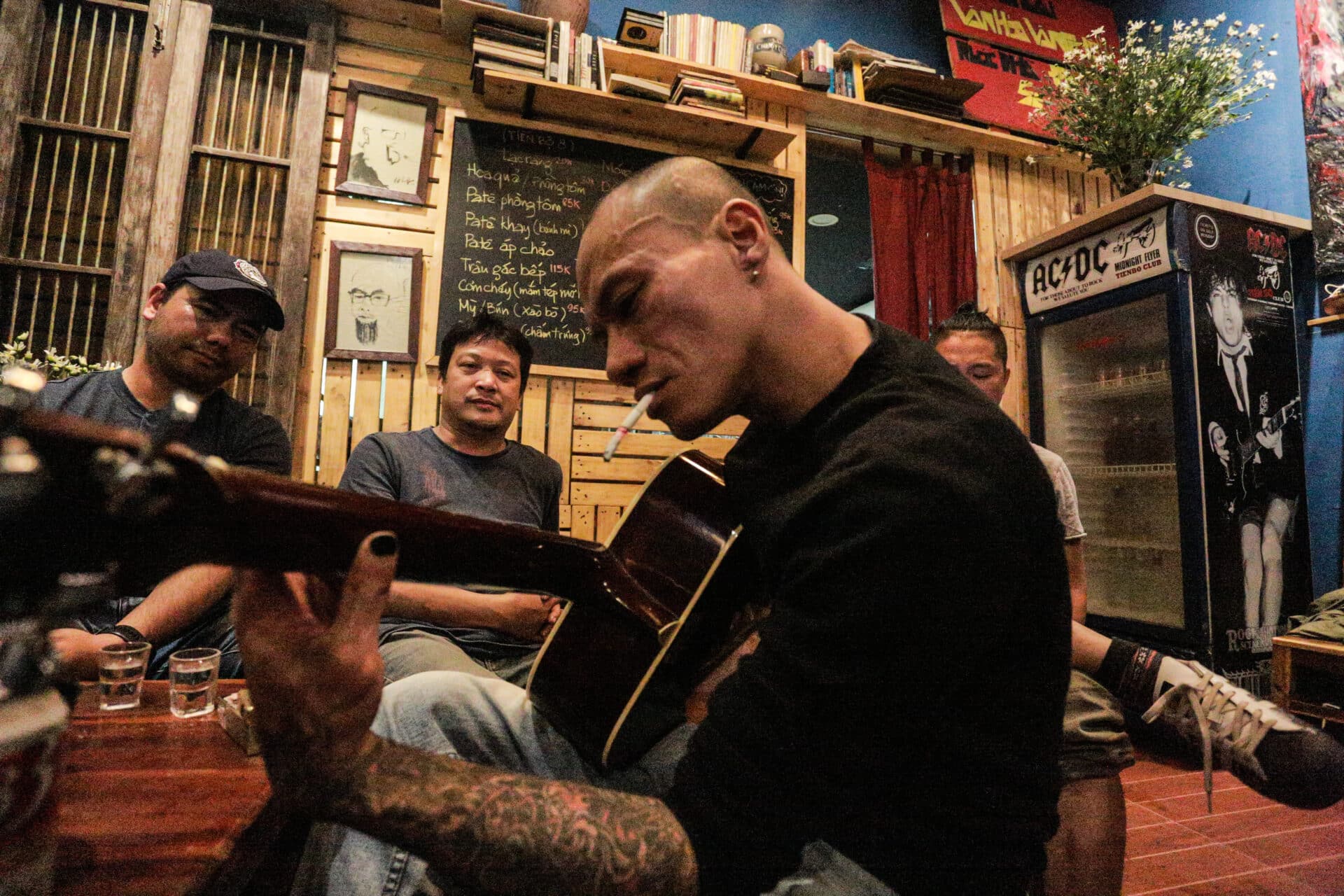
As dusk fell, more and more people arrived. Tonight was more crowded than usual because of the rumors circulating across private messaging groups. Hoàng Trinh, the elderly bar owner of one of the old Four Towns of Hanoi, was making an appearance here, nearly five years after her tavern on Tạm Thương closed down. This old woman—small, shrewd, and composed—is the idol of many drinkers in Hanoi.
“You aren’t escorting Ms. Trinh here?” I asked the owner, as he was continuously gazing at his new shoes. He has a PhD in Anthropology, with additional esteemed degrees from both Vietnam and China. In 2015, we got to know each other through our shared concern—perhaps typical of passionate young people like us—for an ethnic minority group living in a border region. After six diligent years laboring as the administrator and overseer of a research library, he now has only this tavern as his source of meaning. There is no higher subject than food, clothing, and the search for life’s basic necessities, it seems. The customers who come here are like him, having failed midway while neither descending back to the foot of the mountain nor climbing onwards. All of them are literary and intellectual types.
“I had intended to,” he replied, “but she said she could walk here herself.”
“She would be crazy to walk that. The distance from Tạm Thương is nearly ten kilometers. What is she doing that for?”
“Actually, it’s only eight kilometers,” Trung said, smiling playfully and sliding over to my table.
I pulled up a chair for him. Phương, my drinking friend, now had another listener. Phương had just presented a paper on “war and tourism” but, feeling he wasn’t done yet, had dragged me to this tavern to finish his talk. For ten years, his research has revolved around the words “grim legacies.” I have observed at length many drinkers who could make it as writers, but the frontrunner is probably Phương. The son of a prominent professor and patriotic in the extreme, he has poured his youth down the drain of alcohol. A true Hanoian, rapidly outpacing many others in the race to make it as a writer, he calls himself “Hoàng” after the character in Nguyễn Việt Hà’s novel God’s Opportunity.
Phương’s presentation continued for another thirty minutes before breaking into argument. The bar owner Trung was saying that there was a period when the Vietnamese did not despise fascists, evident in the pro-Hitler rhetoric of various pre-1945 newspapers—Germans were fighting against France, just like us. That was how things went, these two were always getting into historical debates. Such petty yet thorny disagreements, though, permitted us to forget about daily worries, which drifted away amidst the vapor of drink.
I could not hear my own laughter because of the noise out on the street, but also because the alcohol was going to my head. I began chatting more with others sitting nearby. At some point, I suddenly felt elated to know these people, my friends, who never consider anything all that important, not even their own lives or loved ones. They needed a place which wasn’t rowdy and expensive like those “beer clubs,” but which was accepting of the second selves that emerged after they abandoned their artistic pretensions and returned to an innate manner of drinking, a place where they could be drunk without having someone judge or gawk. There was a kind of familiarity among everyone, not based on their positions back in society, but through a compatibility of the soul among those who love to drink. The greatest happiness was when the first group of women arrived.
This one woman was about forty and very beautiful. Tonight she arrived with a different guy, who was mostly content to listen and drink quietly in a corner, but was capable, in his soft-spoken way, of discussing a wide range of topics. I’ve long known that he is the son of a prominent writer. The woman and I said hello and we downed a half-bottle of liquor by the time she asked me, “Ms. Trinh still isn’t here?”
A voice from another table called out, “Can someone call her to see if she’s getting here okay, or if she needs a ride?”
Someone else said: “She’s probably stuck in traffic.”
When the lights came on at dusk, the place looked like some art scene, one taken up by a more raucous crowd. I don’t mean like a gallery: this place, as a whole, looked like its own work of art. The space was covered with two patches of color, deep blue and light gray, following no apparent rule, their sinuous outlines connecting in what looked like a single broad stroke, as if drawn by an enormous pencil capable of bending space and time. On this first floor in the center of the room were four tables of bare ebony wood, six chairs at each, and no other decorative items. Surrounding this set-up was framed sheet music belonging to the 60s, from when the South was still referred to as “America’s puppet.” Everything starkly contrasting and with a peculiar gloss, as if coming straight out of film noir. Stepping into this place, one imagines one has come a long distance from Hanoi. It has an ambience lacking among older taverns.
Hanoians drink because it offers a time portal directly into the past of a city which has changed so rapidly over the years. Vietnamese liquor absorbs quickly into the body without causing grogginess, but rather induces a prolonged sensation of levitation. Alcohol rekindles old dreams, awakens submerged sentiments from the past, and collides such memories against reality. The fall of dusk is when the soul of the drinker begins to rise. An entire night remains ahead, the hustle of daytime has fallen away. As such, anyone who starts drinking at four will inevitably have drunk too much by late evening, especially if one has encountered another kindred spirit.
Ms. Trinh still had not come. We had all but forgotten our impatience. In the end, it was as if we were waiting for Godot. But that state of affairs has been going on for a long while now in all of our lives.
At a table in the back where someone was strumming away, there was a drummer who used to play for a band called The Wall. At the right-most table was where the “eternally young” had docked. They were a group, all from the generation born in the 1980s, which refuses to grow old. Because being intoxicated for half of one’s life makes one forget how to age. With a slated lineup from Nirvana to Scorpion, everyone’s vocal cords were roaring through their bygone memories. Having forgotten this lifetime. And having forgotten that there is nothing really worth roaring about. Someone—the best acoustic guitarist here—had spent his youth in prison. While the best classical guitarist here was that same famous drummer from The Wall, whose stage name is Bình Bát (“Alms Bowl”).
Coming out of the darkness, Ms. Trinh’s shadow ambled along, slowed, then stopped beneath the old sycamore—which blocked the front door and had therefore long been regarded as a financial obstacle for the tavern. Without any announcement, the guitar paused, and so did everyone’s drinking. This person who had not, for her entire life, set foot outside Hanoi’s Old Quarter had finally come to this place. She had covered ten, no, eight kilometers. Entirely by foot, just to stand here, against the glossy door of this trendy tavern, but still with the same old customers. And still going to be closed down. It turned out she could not drive and could not ask her children—who had separated themselves from this life of drinking—to bring her here. We all came out to welcome her.
She was very pleasant when meeting me again. With her toothless gums, she spoke with wit and accuracy about everything: “You sing ‘White Autumn’ very well. Everyone who hears you for the first time likes it straightaway.” Nobody remembers how I used to sing “White Autumn” until I lost my voice from drinking too much. Ms. Trinh recognized each person, greeting them as if they were grandchildren who no longer lived at home. Her chief question to most of the men at the tavern was, “So, you’re with wife number what, now?”
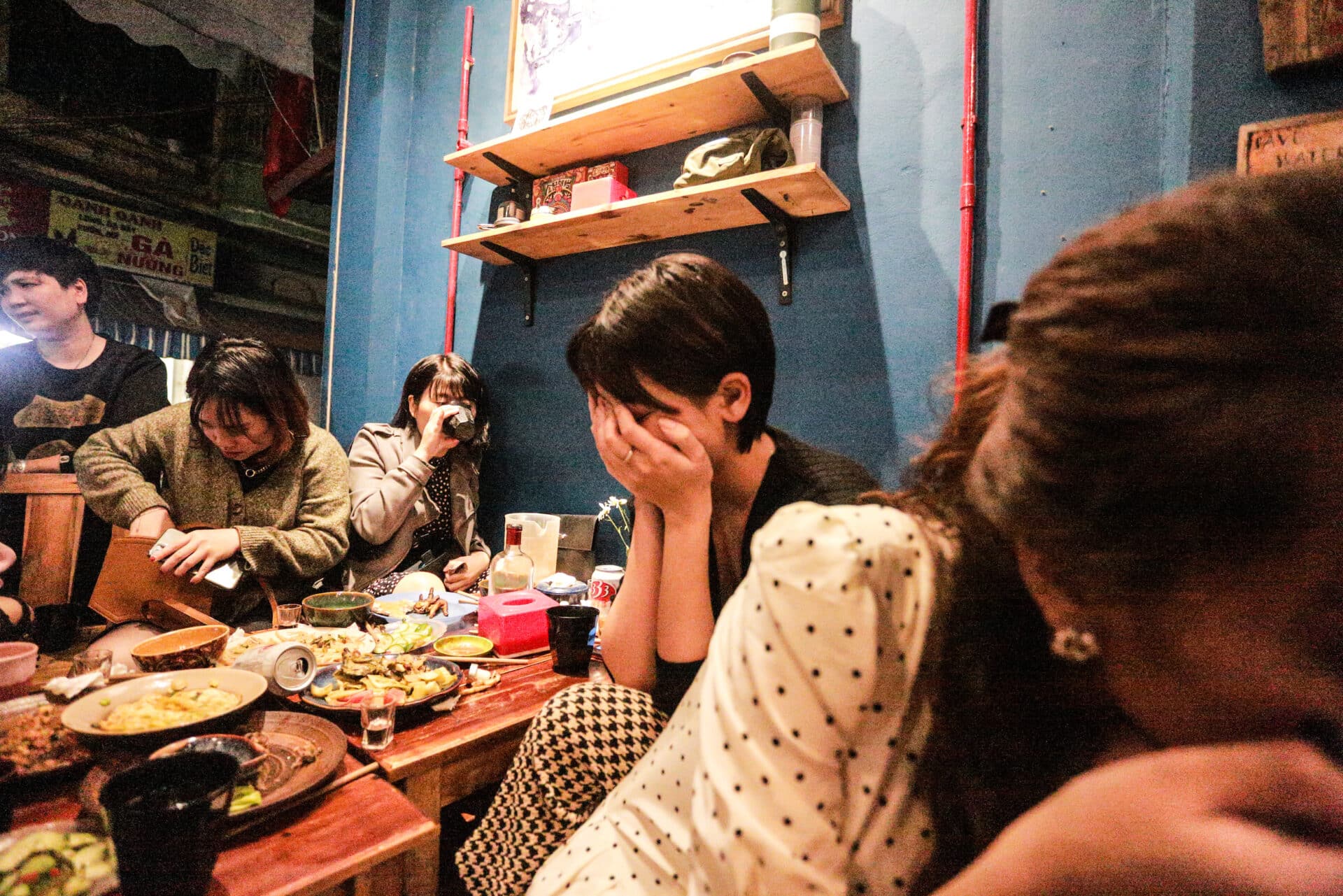
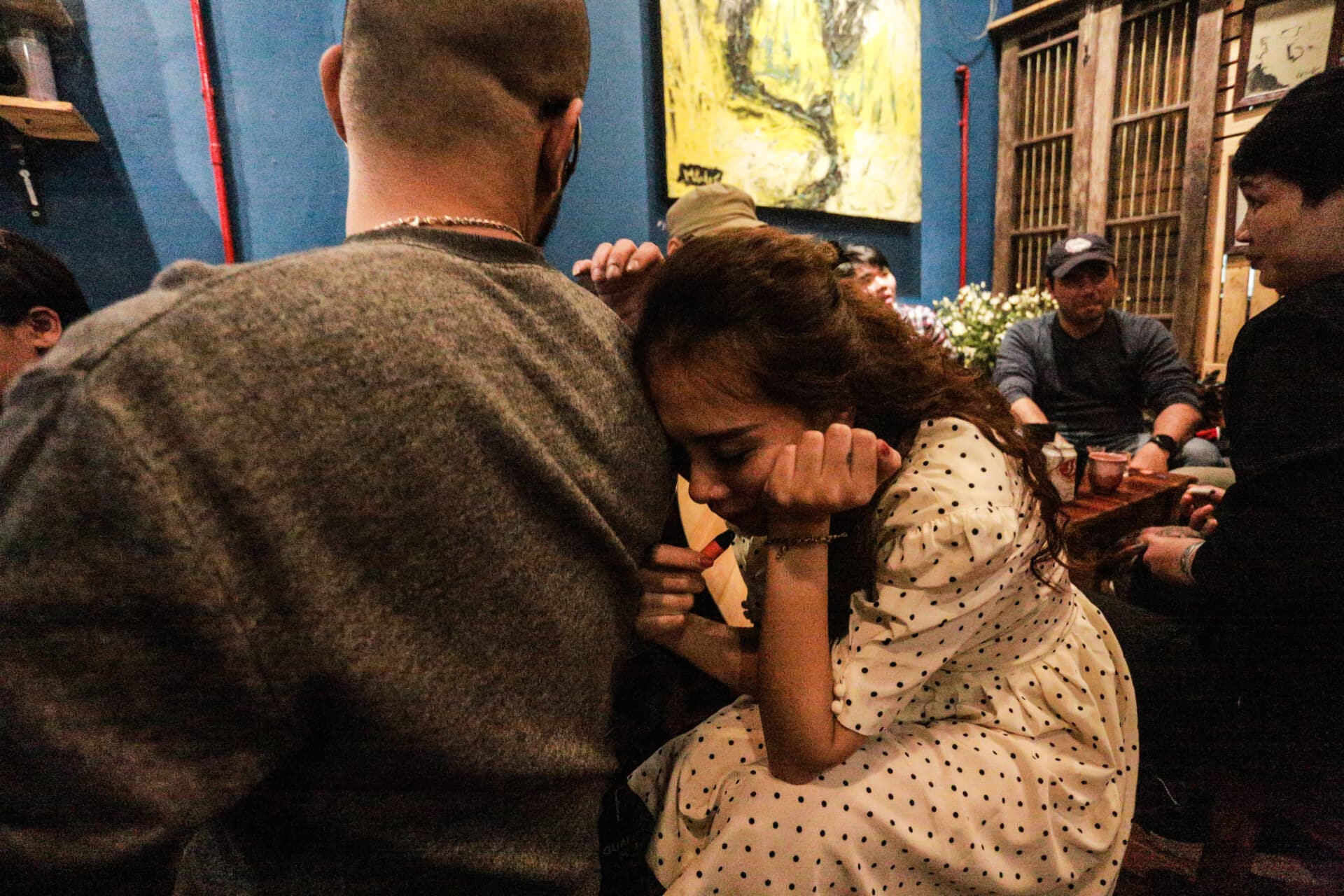
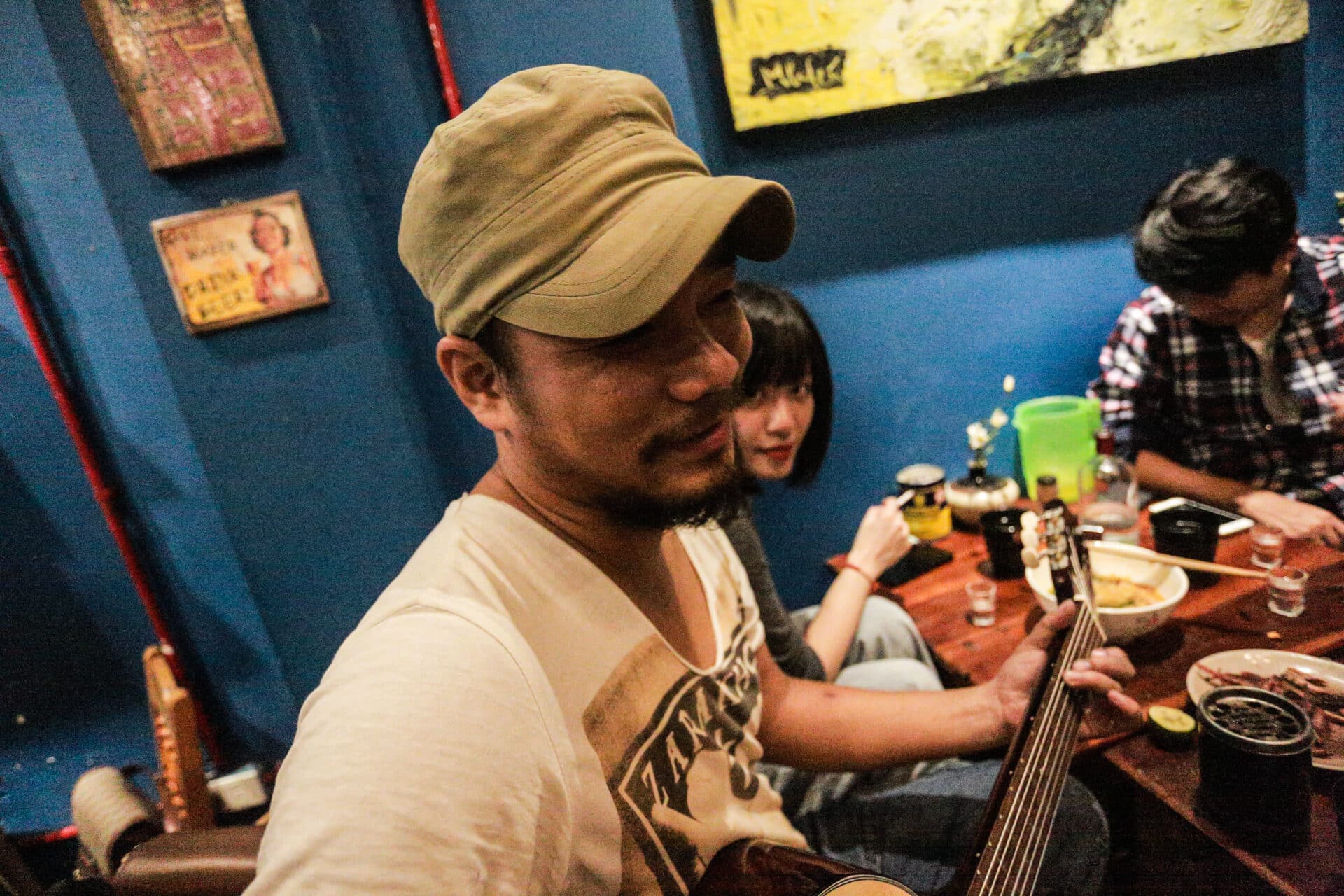
She started arguing a bit with Trung about the way he was running the tavern. She said a good tavern that would last twenty-plus years needed to be able to cut unnecessary expenses. “The chairs and tables should not be too large nor too new. The guests should be able to see their glass and their own two feet among the sawdust on the ground. And don’t expect to make much money from the food: people come to taverns to drink, not to eat. And the owner must be steely.” I didn’t really understand what she meant by “steely,” unless “steely” meant being argumentative towards one’s customers, in which case, Trung was probably doing quite well. Her voice revealed an eagerness to “lecture” about her years of experience, and everyone nodded automatically—though perhaps more from drunkenness than agreement.
Finally, Trung brought himself to respond, and spoke loudly: “Tonight, Ms. Trinh is an esteemed guest. I invite everyone to eat and drink, no charge. This is an official statement.”
Ms. Trinh has supposedly not consumed a single drop of alcohol since she was a teenager. In my own alcohol-soaked memory, it indeed seemed that Ms. Trinh had only ever wafted the aroma of alcohol, but never actually drank it. Nobody in her family had a habit of drinking or brewing liquor. But tonight she will break with tradition, won’t she? The era of the Old Quarter’s drunken old men was coming to an end.
I don’t remember the rest of the night. The next morning, I woke up alone, surrounded by the blue walls of Tiến Bộ. From outside, a fragment of sunlight filtered through. When I opened the door, the owner’s child was about to leave for school. With crossed arms, the child said goodbye.
© Đức Anh
English translation © Sydney Van To
Commissioning editor: Quyên Nguyễn




